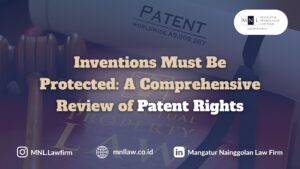
INVENTIONS MUST BE PROTECTED: A COMPREHENSIVE REVIEW OF PATENT RIGHTS
An invention (or novel discovery) constitutes the result of intellectual labor, scientific knowledge, and practical experience, materialized in a technological creation. An invention carries both economic value and social utility. Accordingly, the legal rights of the person(s) who conceive such inventions (i.e., the inventor) must be protected by statutory law.
In practice, numerous inventions remain improperly registered or recorded, resulting in legal disputes between the inventor and third parties. Such disputes do not always stem from malicious intent, but rather from a lack of understanding regarding patent rights.
Definition of Patent Rights
According to Article 1 of Undang-Undang Nomor 65 Tahun 2024 Tentang Perubahan Ketiga Atas Undang-Undang Nomor 13 Tahun 2016 Tentang Paten (“UU 65/2024”):
“A Patent is an exclusive right granted by the state to an inventor for their invention in the field of technology, for a limited period, to personally exploit the invention or to authorize other parties to do so.”
An invention refers to the expression of an idea involving the resolution of a specific technical problem, resulting in a product, process, improvement, or development thereof, including systems, methods, or uses.
An inventor is an individual or group of individuals who have collectively developed an idea and executed the activity which results in an invention.
Legal Protection of Patent Rights
Patent rights in the Republic of Indonesia are specifically governed by Undang-Undang Nomor 65 Tahun 2024 Tentang Perubahan Ketiga Atas Undang-Undang Nomor 13 Tahun 2016 Tentang Paten (“UU 65/2024”). Patent protection encompasses both patents and utility model patents (commonly referred to as simple patents).
As stipulated under Article 3 of the Patent Act:
-
- Patent: Granted for inventions that are novelty, contain an inventive step, and are industrially applicable.
- Simple Patent (Utility Model): Granted for any new invention, being a development or improvement of an existing product or process, and industrially applicable.
However, Article 4 provides statutory exclusions from what may be deemed a patentable invention. These include:
-
- Aesthetic creations;
- Schemes;
- Rules and methods for: Mental acts, Games, and Business methods;
- Rules and methods consisting solely of computer programs;
- Presentations of information;
- Discoveries, such as: A new use of an existing or known product, and/or, A new form of a known chemical compound that does not significantly enhance efficacy and has known chemical structure relationships.
Duration of Patent Protection
According to Article 22 of the UU 13/2016 jo. UU 65/2024:
- A Patent shall be granted for a term of 20 (twenty) years, commencing from the filing date.
- This term is non-renewable.
- The commencement and expiration dates shall be recorded and published electronically and/or in non-electronic media.
As for Simple Patents, under Article 23:
- The term is 10 (ten) years from the filing date.
- The term is not extendable.
- Term details are similarly published and recorded.
Requirements for Obtaining a Patent
To acquire patent protection, the following substantive conditions must be satisfied:
-
- As provided under Article 3:
- Novelty
- Inventive step
- Industrial applicability
- The invention must not fall within statutory exclusions under Article 4 (as previously discussed).
- The invention must be filed with the Directorate General of Intellectual Property (DGIP) through: Online application at https://dgip.go.id/menu-utama/paten/syarat-prosedur or offline filing at the DGIP central or regional offices.
Legal Sanctions for Patent Infringement
-
- Civil Liability (Tort Claim / Civil Suit):
Where infringement is established—such as unauthorized use of an invention—the patentee or licensee may file a claim for damages before the Commercial Court in the jurisdiction where the defendant resides.
If either party resides outside Indonesia, the suit may be lodged with the Central Jakarta Commercial Court, pursuant to Articles 143 and 144 of the UU 13/2016 jo. UU 65/2024
- Alternative Dispute Resolution:
Pursuant to Article 153, in addition to court proceedings, parties may resolve disputes via arbitration or alternative dispute resolution (ADR) in accordance with applicable laws and regulations.
- Criminal Sanctions:
As stipulated in Article 161:
“Any person who intentionally and without legal authorization engages in acts as referred to in Article 160, with respect to a patent, shall be subject to imprisonment for up to four (4) years and/or a fine up to IDR 1,000,000,000 (one billion rupiah).”
Under Article 162, for Simple Patents:
“Any person who intentionally and without legal authority violates the provisions of Article 160 with respect to a simple patent shall be punished by imprisonment of up to two (2) years and/or a fine not exceeding IDR 500,000,000 (five hundred million rupiah).”
- Civil Liability (Tort Claim / Civil Suit):
Conclusion
Patent rights constitute exclusive legal protection afforded to inventors for their technological inventions—20 years for patents and 10 years for simple patents. To qualify, inventions must be novel, involve an inventive step, and be industrially applicable. Certain subject matter, such as pure business methods and computer programs, are statutorily excluded. Patents must be registered with the Directorate General of Intellectual Property (DGIP). Infringement may result in civil remedies, arbitration, or criminal penalties, pursuant to UU 13/2016 jo. UU 65/2024.
Legal Basis
Undang-Undang Nomor 65 Tahun 2024 Tentang Perubahan Ketiga Atas Undang-Undang Nomor 13 Tahun 2016 Tentang Paten.
Author:
Nicko Surya Airlangga, S.H.
Masta Pasaribu
Editor:
Muhammad Arief Ramadhan, S.H.
